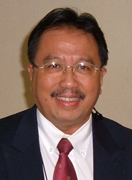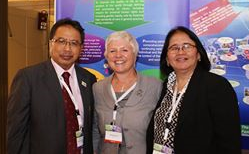JAMAL, A/Prof Mohammad Husni
WONCA conference chair - Malaysia

A/Prof (Mohammad) Husni Jamal is chairman of the Host Organising Committee for the WONCA Asia Pacific Regional Conference coming up in Kuching in May, 2014. He is also a member-at-large, WONCA Asia Pacific Executive for 2013-2015.
Tell us about your path in family medicine?
I graduated from the Faculty of Medicine, University of Malaya, in 1980. After eight years of government service in various fields, I went into private general practice, beginning initially as a solo practitioner and subsequently the principal partner of Klinik Husni, Tengku Mohamed dan Rakan-rakan. I am a Fellow of the Academy of Family Physicians of Malaysia and a Fellow of the Royal Australian College of General Practitioners, and also hold a degree in Masters in Business Administration
After 25 years in private family practice, I retired and decided to become an academic and was offered the post of Associate Professor in the Department of Family Medicine, Faculty of Medicine, Cyberjaya University College of Medical Sciences since 2012, and I hope to further my interest in Health Management, focusing on Primary Care.
I have been actively involved in the Council of the Academy of Family Physicians of Malaysia ( AFPM ) since the year 2000, having served in the following posts : Council member; EXCO and Honorary Treasurer; Director of Medibase (the subsidiary of AFPM that coordinates postgraduate courses); Quality Primary Car, another subsidiary of AFPM; AFPM Board of Examiners; and AFPM’s representative to WONCA Asia Pacific Council and Wonca World Council.
I have also sat on the following committees in the Ministry of Health : Committee on Managed Care; Organising Committee member of National Primary Healthcare Conference Malaysia 2008; Influenza A H1N1 Technical Committee 2009. I have been Honorary Secretary of the ASEAN Regional Primary Care Physicians ( ARPaC ), since its inception in 2007.
You have attended many Wonca conferences – tell me of your Wonca involvement
My first exposure to the world of WONCA was the WONCA AP Regional Conference in Kyoto, Japan, in 2005. Ever since then, I had not missed a single WONCA AP and World WONCA conferences, except for the WORLD WONCA in Cancun, Mexico, in 2010.
WONCA has enabled me to make friends, especially family physicians, from all over the world, and the joys of working and sharing experiences with them. I learn to appreciate the wonderful work done by fellow colleagues, in different conditions - some with all the most updated technologies and modern, comfortable environment ; whilst others toil and serve faithfully in conditions full of hardship - but truly, the pride of serving as a Family Physician, irrespective of the environment, is one that I appreciate most, from all of them.
And I too, share their pride in being one.
 Photo: Husni in Prague in 2013, with Prof Amanda Howe (WONCA President Elect) and Prof Zorayda 'Dada' Leopando (Chair of WONCA working Party on Women in Family Medicine)
Photo: Husni in Prague in 2013, with Prof Amanda Howe (WONCA President Elect) and Prof Zorayda 'Dada' Leopando (Chair of WONCA working Party on Women in Family Medicine)
And I have dedicated a WONCA page in my Facebook to share my memories with my friends.
I must acknowledge and express my sincere appreciation to the late Dr M K Rajakumar ( for whom the Rajakumar Movement was created in honour of ), who ' jolted ' me into the world of WONCA, when I joined him in Kyoto in 2005, and to my mentor and WONCA travelling companion, Datuk Dr Daniel Thuraiappah, with whom I share many wonderful memories of the WONCA family ever since we became buddies from Kyoto onwards.
About primary care in Malaysia
Public healthcare :
Malaysia has a mixed public-private healthcare system. In the public sector, the Ministry of Health is the main healthcare provider through its extensive network of primary care clinics.
The development of Primary care was the focus of health ever since the country, Malaya (then), gained Independence from the British in 1957. As such, it is considered to be very well structured today, and certainly one of the best in this region.
In the public sector, primary care is provided mainly by the Ministry of Health ( MOH ) under a two tier system – comprising of rural clinics manned by one or two community nurses; and Health Clinics ( or called Community Polyclinic for newer clinics) and Maternal &
Childhealth Clinics in bigger rural towns and in urban areas, providing a comprehensive range of services. To enhance equity of care, the public clinics initially focused on rural areas, but it has now targeted the urban poor as well.
In more than 250 health clinics, a family physician is made available, assisted by several medical officers and other support staff. The whole range of care is available, taking the life-course approach to care, including maternal and child health; geriatrics. emergency services and vaiorus support services (which include Radiology, Laboratory and Pharmacy services).
Patients access to the MOH primary care service is direct, as walk-in patients ; on the other hand access to specialist services in primary care centres or hospitals is through referrals to ensure
appropriate use of scarce resources. However, in the private sector, access is based on ability to pay and therefore, does not require any referral in most cases.
Private Healthcare :
Private general practitioners operate as solo or group practices, and they form the major providers in the urban areas. However, of late they have also expanded into the smaller towns too. It is estimated there are about 7,000 general practitioners in the country.
Presently, the Malaysian system allows doctors without a specialist qualification to practice as general practitioners as opposed to other countries that do not allow this.
Can you tell me about the Academy of Family Physicians of Malaysia?
The Academy was established as the College of General Practitioners of Malaysia in 1973. It was renamed as the Academy of Family Physicians of Malaysia (AFPM) after its application for registration was approved by the Registrar of Societies in 1996.
The primary aim of the AFPM is academic; that is education, training, assessment, research and publication in the discipline of general practice/family medicine.
The AFPM has been in the forefront in the provision of General Practice education and training in areas related to the practice needs of its members. These courses are conducted in collaboration with local and foreign institutions.
Is there Family Medicine Specialty training in Malaysia?
The training of Family Medicine as a specialisation in Malaysia is by way of two alternative pathways. The first option is through the University 4-year Masters programme, leading to the qualification of Masters in Family Medicine -currently, the number of Family Medicine specialists who graduated from this programme is 250. The second option is by obtaining the professional conjoint MAFP/FRACGP certification coordinated by the Academy of Family Physicians of Malaysia and the Royal Australian College of General Practitioners. To date, 309 doctors have successfully passed this examination.
The jewel in the crown of the AFPM is the training of general practitioners towards the specialty of family medicine. The Academy has undertaken this course in conducting a four year structured program. For the first two years, the general practitioners undertake the Diploma in Family Medicine ( DFM ) which qualifies the doctor to be a trained general practitioner. This status may be required by the Malaysian Medical Council eventually for one to practice as a general practitioner.
Currently, the number of those who passed the Diploma in Family Medicine is 313, and another 397 are undergoing the course.
The trained general practitioner with the DFM qualification is the requirement to enrol for the Advanced Training Program (ATP) which prepares for the professional exam, which is the Membership of the Academy of Family Physicians. This examination is conducted conjointly with the Fellowship of the Royal Australian College of General Practitioners. The ATP programme had recently been introduced, and 11 doctors recently graduated from the first batch. Another 143 candidates are undergoing this course.
The Academy conducts other courses in specialised disciplines of Cardiovascular diseases, Ultrasound and Dermatology in primary care.
Members are encouraged to continually enhance their skills and practices by enrolling in the quality improvement program to come into international standards of practising quality and safe healthcare practices. The Academy guides and certifies practices to maintain best practice standards in the clinics.